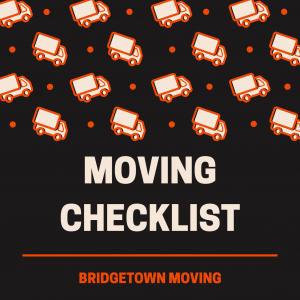One Month Before Moving
Pick up a Change-of-Address Kit from the Post Office. Also notify the address change with:
- Friends and family
- Banks
- Insurance companies
- Credit card companies
- Magazines and newspapers – cancel local newspaper delivery
- Doctors, dentists and other providers – transfer drug prescriptions
- Past employer – for W2 forms
Take a look around the house. Start to think about what you don’t want to take with you.
- Use up perishable foods
- Sell, donate or hold a garage sale for unwanted items
Prepare a list of what you want to move.
- Large appliances?
- Outside furniture?
For full service moves:
- Get written estimates from several moving companies
- Will the movers pack for you?
- What items won’t they move?
- Get appraisals of high-value items in case of future claims
For do-it-yourself moves, make arrangements for truck rental and moving help, and buy packing supplies:
- Boxes
- Packing and masking tape
- Markers
- Newspapers
- Twine
Start packing boxes. Mark boxes clearly as to contents and room to be placed in. Mark “Open First” clearly on boxes containing important items to be unpacked first:
- Dishes
- Pots and pans
- Alarm clock
- Bedding
- Special toys
- Towels
- Lightbulbs
- Plates
- Tools – hammer, pliers, wrench
Stop by and make arrangements for picking up your important records:
- Birth
- Doctor
- Dentist
- Legal
- Optician, optometrist
- School – make sure you get one with a raised seal
- Veterinarian
Close out your bank accounts:
- Checking
- Savings
- Safe Deposit Box
Start a new bank account in your new town.
- Transfer account from current bank?
Contact your child’s new school and notify them of your upcoming move to their area.
Contact the Chamber of Commerce in your new town. Request a relocation package.
Two Weeks Before Moving
Pack your vital documents in one place:
- Passports
- Military records
- Mortgage records
- Marriage license
- Birth certificates
- Vehicle titles
- Stock certificates
- Insurance papers
- Bank records
- School records
- Medical records
- Tax records
Make arrangements to disconnect your utilities. Get refunds for any deposits made. Have meters read. Give new address for them to send their final bill:
- Cable – return box if necessary
- Electric
- Gas
- Internet access
- Telephone
- Water
Make arrangements to connect utilities at your new residence.
Make arrangements for cleaning
Inquire about your new state’s auto licensing procedure and auto insurance rates.
Check with your insurance company about transferring coverage to your new home.
Arrange to have a sitter watch your children at their house on moving day.
One Week Before Moving
Dispose or drain any flammable items:
- Lawn mower gas
- Snow blower gas
- Paint
- Aerosol cans
Plan what goes in the car with you:
- Toys and games for kids
- Special breakable items or collections
- Important documents and records
- Change of clothes and toiletries for your first day
- Vacuum cleaner – if you want to clean right away
- Toilet paper
- First aid kit
- Food kit with bottled water, cereal, bananas
Make travel arrangements for your pets and plants.
Purchase moving insurance if you have valuable antiques and collections.
Have your car tuned up.
The Day Before Moving
- Defrost, clean and air out your refrigerator.
- Clean your stove.
- Make sure you have payment ready for the mover – they will not unpack without a check. Check your moving company’s payment policies.
- Purchase traveler’s checks for other possible expenses.
- Pack your former town’s phone book for future correspondence.
- Get a simple breakfast ready for the next morning.
- Pick up ice and beverages for moving day.
- Take down curtains and curtain rods.
- Get a good night’s sleep.
Moving Day
- Strip your beds.
- Moving company – will they disassemble?
- Show movers around. Make sure your possessions to be moved are inventoried with them.
- Write “subject to further inspection for concealed loss or damage” on contract when you sign to protect yourself should you find damage while unpacking.
- Get all keys together. Put in a safe spot.
- Make sure moving van driver has correct address, phone number and directions. Confirm delivery date with him.
- Check all rooms one last time. Remember closets and cupboards, basement and garage! Make sure all windows and doors are locked.
After Moving
- Explore your new neighborhood. Locate the nearest convenience and hardware store, pharmacy, supermarket, video rental, school and library, etc.
- Check smoke alarm, carbon monoxide detectors, and fire extinguisher.
- If necessary, install a new door lock and/or dead-bolt.
- Update your address information if you haven’t done so (driver’s license, car registrations, insurance, credit cards, bank accounts, voter registration).
- If you have not received your security deposit, call your landlord to confirm your new address.
- Call the Internal Revenue Service to change your address. You can also visit the IRS online at www.irs.gov.
